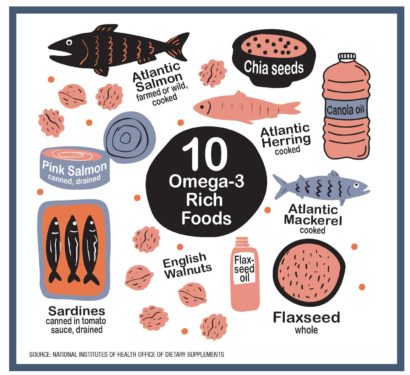There’s nothing fishy about omega-3 fatty acids
Dietary fat is in fashion — and the type of fat you eat matters, especially for your brain health.
The human brain is nearly 60% fat, and it thrives on fatty acid molecules for optimal function and health. Because the body cannot make fatty acids from scratch, it’s important to get fatty acids from foods and supplements.
Two types of omega-3 fatty acids — DHA and EPA — are particularly beneficial for brain health and overall health.
Omega-3 fatty acids are anti-inflammatory and can protect against various neurological and metabolic diseases, says Papasani V. Subbaiah, PhD, professor of medicine and biochemistry and molecular genetics at the University of Illinois at Chicago College of Medicine. Subbaiah authored a recent study about DHA, EPA and the brain, published in 2019 in the Journal of Lipid Research.
The brain’s neurons or chemical messengers are packed with DHA. Without it, the brain would not function properly. DHA plays several key roles in brain development and function, Subbaiah says, including helping with neurotransmitter function (sending chemical messages to neurons) and modulating gene transcription (altering the expression of genes).
EPA also has an important role in the brain. Studies have shown that EPA helps in the prevention and treatment of depression, Subbaiah says, but more research is needed on exactly how EPA works.
While omega-3 fatty acids are important, research has been mixed about omega-6 fatty acids — found in refined vegetable oils (such as canola oil), nuts and seeds. While some studies have said that omega-6 fatty acids are pro-inflammatory, others have shown that consumption doesn’t increase inflammation, according to a 2018 review in the journal Prostaglandins, Leukotrienes & Essential Fatty Acids.
Something fishy
Fish and fish oils are good sources of DHA and EPA, says Kristin Gustashaw, RDN, a clinical dietitian at Rush University Medical Center.
Cold water fatty fish — such as salmon, herring, tuna, sardines and Atlantic and Pacific mackerel — feed on phytoplankton, which eat omega-3-rich microalgae. This fortifies fish with beneficial fatty acids.
Eating these fish is the best way to get the fatty acids you need. “Eat fish at least two times per week to get a good dose of omega-3s,” Gustashaw recommends.

For women who are pregnant and breastfeeding, eating at least 8 to 12 ounces of omega-3-rich seafood per week is important for brain development during the fetal and postnatal periods.
In addition to omega-3s, fish have high-quality protein, brain-healthy vitamins and minerals, and less saturated fat, Gustashaw says. Be sure to bake, grill or broil your fish, as frying can defeat the health purpose.
One caveat: Stick with lower-mercury seafood, such as salmon, anchovies, herring, shad, sardines, Pacific oysters, trout, and Atlantic and Pacific mackerel. Avoid the larger king mackerel, shark, tilefish, swordfish and ahi tuna, because they are high in mercury.
Plant-based omega-3s
If you’re not a fish eater, try omega-3 fortified foods, such as some types of milk, yogurt, juice, soy milk and eggs. Seeds and nuts contain omega-3s called ALA, which your body converts to DHA and EPA, though in smaller amounts than from fish. Flaxseed, chia seeds, hemp seeds and walnuts are good choices.
However, Subbaiah cautions, “The plant-based omega-3s may not be sufficient for the brain because conversion of ALA to EPA and DHA is very inefficient.”
Even though they have fewer fatty acids, eating at least one cup of leafy greens and at least two tablespoons a day of seeds or ¼ cup a day of walnuts provides vitamins, minerals, fiber and protein, in addition to omega-3 fatty acids.
What about supplements?
The multitude of omega-3 supplements on the market today makes you think that you should be taking supplements, right?
Before you invest in fish oil capsules, note that the research on fish oil supplements and cognitive health is not conclusive. Taking omega-3 fish oil supplements may not have the same protective effect as eating fish.
A meta-analysis of 24 studies, published in the Journal of Psychopharmacology in 2015, found some marginal evidence that omega-3 supplementation improved cognition in those deficient in omega-3 fatty acids. But there was not evidence of a benefit for the general population and for those with neuro- developmental disorders.
Subbaiah agrees that omega-3 supplements haven’t shown benefit for brain health. “Our studies show that the currently available supplements, including fish oil, krill oil, ethyl esters and free fatty acids, are not suitable for brain enrichment of omega-3,” says Subbaiah, who is planning clinical studies to examine specific forms of DHA and their effects on patients with dementia.
While researchers continue to learn about supplements, there is certainly nothing fishy about the importance of omega-3 fatty acids for your brain and overall health.

Vicki is a registered dietitian nutritionist, lifestyle nutrition expert, writer, culinary and media consultant and author of two books.










